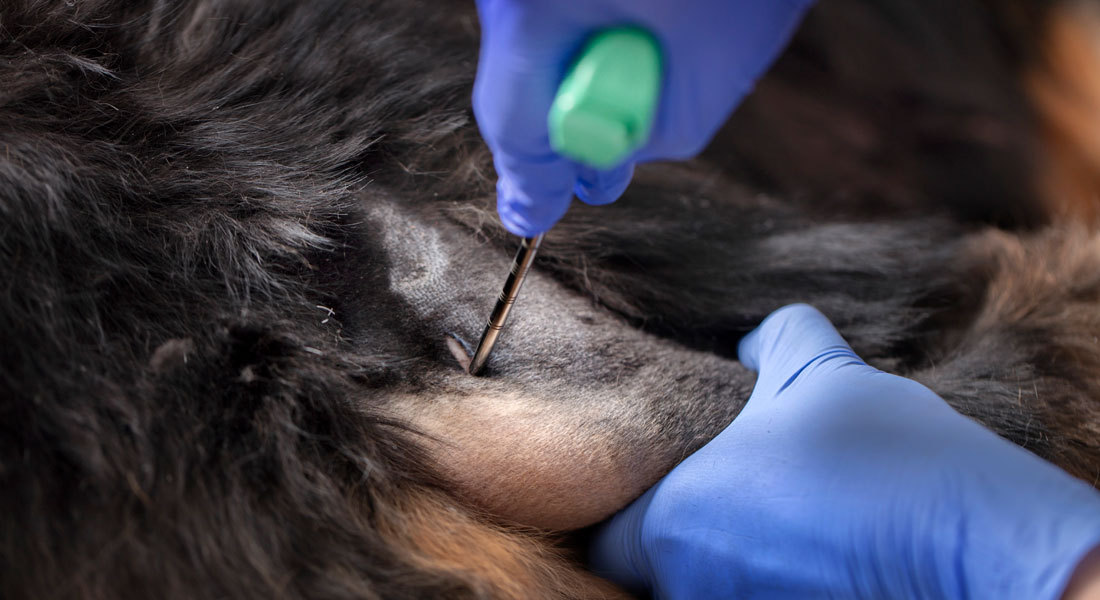Companion Animal Oncology – Medical Oncology I
This course is a specialisation course at the Master of Companion Animal Clinical Science. The Master is a post graduate education targeted small animal veterinarians seeking Continuing Professional Development (CPD).

The purpose of this course is to provide experience and expertise in diagnostic work up including staging and grading of the oncology patient, the use of diagnostic tools including biopsy principles and staging and grading of the most common companion animal cancers.
Each participant makes diagnostic procedures for staging and grading of oncology patients for their own practice.
Read more about the Master of Companion Animal Clinical Science.
Lectures, Theoretical and practical exercises. Case studies.
Having completed the course, the student must be able to:
Knowledge
- Describe common ethical considerations in companion animal cancer patients.
- Define and describe the safety procedures regarding use of cancer chemotherapy drugs according to Danish law.
- Explain and demonstrate overview of carcinogenesis.
- Define, identify and demonstrate overview of diagnostic methodology and paraclinical tools used in the diagnostic work up incl. biopsy principles of the companion animal oncologic patient.
- Explain, reflect about and demonstrate overview of staging and grading of the companion animal cancer patient.
- List and classify the staging and grading of common companion animal cancers.
- List, classify, and demonstrate critical reflection on existing and new approaches to patient diagnosis and client education.
- Demonstrate an overview of the veterinary use of chemotherapy.
Skills
- Use appropriate diagnostics for staging and grading of specific companion animal cancer types according to WHO staging criteria.
- Interpret, assess and reflect on collected patient data in order to stage and grade and make clinical decisions, arrive at a diagnosis and apply and integrate evidence based scientific approaches to plan and administer further diagnostics and suggest therapeutic management in companion animal cancer patients.
- Continuously seek out, reflect on and apply new evidence based diagnostic methods and biomarkers in companion animal cancer patients.
- Apply and integrate appropriate safety procedures in relation to the use of chemotherapy.
- Communicate and discuss ethical and academic issues with both peers and non-specialists at an advanced level.
- Communicate effectively in writing and pass on results to relevant parties.
Competences
- Evaluate and manage the staging and grading of companion animal cancer patients which may necessitate novel solutions and approaches identified from current medical literature or other ressources.
- Work independently, take responsibility for, predict, prognosticate based on staging and grading for commonly treated companion animal cancers.
- Collaborate constructively within and between specialists/professionals and lay persons involved in companion animal cancer patient management .
- Make ethic considerations regarding diagnostic methods and medical therapy in companion animal cancer patients.
- Independently evaluate and structure own learning processes and continuously obtain new knowledge within the diagnostic work up of companion animal cancer patients.
You must meet the following criteria to be admitted to this course:
- Hold a degree in Veterinary Medicine.
- Hold one of the following certifications:
- DVA Certificate in Small Animal Diseases (equivalent to the 4 compulsory courses of the Master of Companion Animal Clinical Science).
- Swedish / Norwegian / Finnish specialist in diseases of dogs and cats.
- Equivalent competences.
- Have a minimum of 2 years of relevant work experience from companion animal practice.
- Be proficient in English.
Find detailed information about the formal requirements for this course.
The course responsible at the specialisation track in Companion Animal Oncology is:
- Assistant Professor Betina Børresen, Department of Veterinary Clinical Sciences, University of Copenhagen, Denmark.
Lecturers at the specialisation track are:
- Professor of Veterinary Oncology Joanna Morris, Glasgow University.
- Professor of Soft Tissue and Oncologic Surgery Kyle Matthews, North Carolina State University.
- Professor of Bioethics Peter Sandøe, University of Copenhagen.
- Professor Companion Animal Clinical Oncology Annemarie Thuri Kristensen, University of Copenhagen.
- Associate Professor of Oncology Maja Louise Arendt, University of Copenhagen.
- Assistant Professor of Oncology Betina Børresen, University of Copenhagen.
- Professor of Veterinary Imaging Fintan McEvoy, University of Copenhagen.
Course details
| Duration: | 5 days |
| Dates: | Offered next time spring 2026 |
| Frequency: | Only available every second year |
| Course capacity: | 12 students |
| Place: | University Hospital for Companion Animals, Frederiksberg, Denmark |
| Course fee: | EU/EEA citizens Single course participant: 33,500 DKK Master student: 30,000 DKK Non-EU/EEA citizens Single course participant: 37,740 DKK Master student: 34,240 DKK Tuition fees include course materials and lunch/coffee. Books are not included in the tuition fees and must be purchased by the participants. |
| Level and credit: | Master course; 6 ECTS |
| Examination date: | Please consult the exam schedule |
| Application deadline: | Master's programme: 1 May 2025 Course: February 2026 |
| Admission: | To be admitted, you must meet the admission criteria for specialisations at Master of Companion Animal Clinical Science |
The opening of the application period is announced via the programme newsletter.
Download course curriculum
